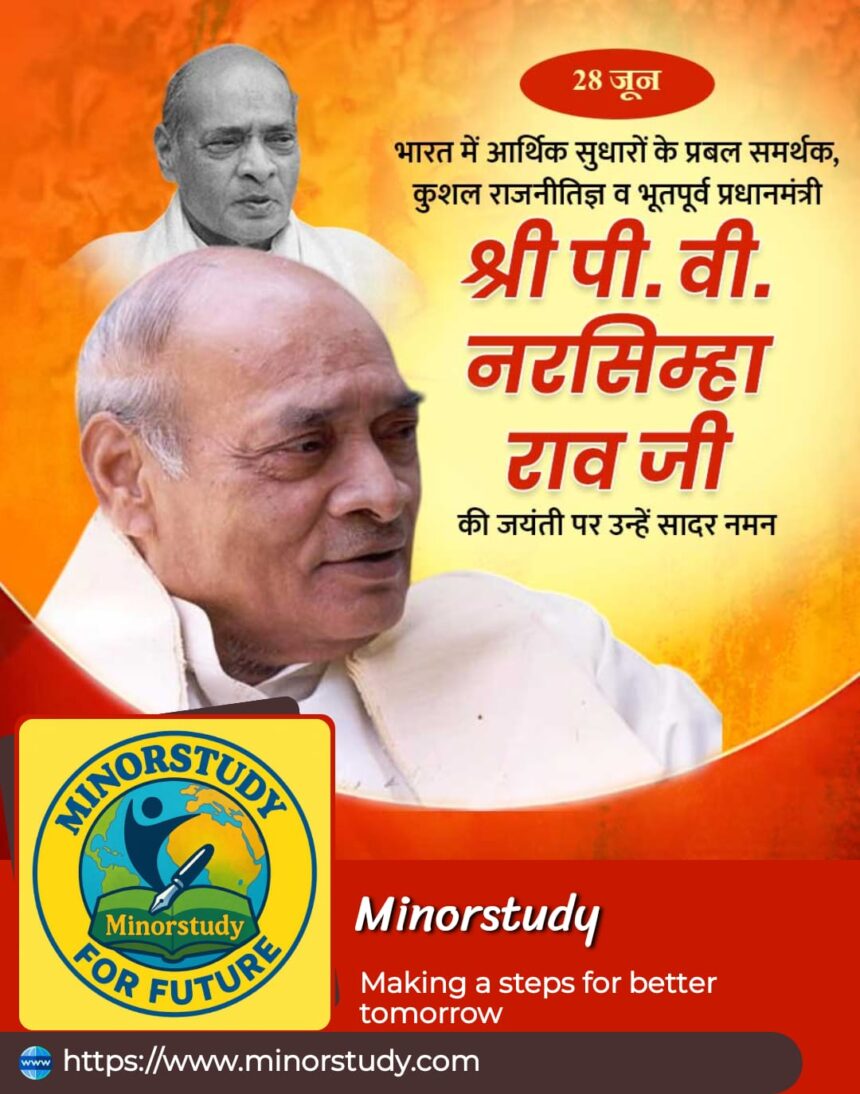Introduction: The Unsung Architect of Modern India
P.V. Narasimha Rao Ji: In the story of India’s rise as a global economy, one name often goes underappreciated — Shri P.V. Narasimha Rao Ji. He wasn’t just a Prime Minister; he was the father of India’s economic liberalization, a multilingual scholar, a political reformer, and a statesman whose calm leadership in turbulent times saved India from economic collapse.
- Introduction: The Unsung Architect of Modern India
- 📜 Early Life and Background
- 🕰️ Political Timeline: From Grassroots to Prime Minister
- 🔎 9 Incredible Facts About P.V. Narasimha Rao Ji
- 💡 His Most Significant Contribution: 1991 Economic Reforms
- 💬 FAQs About P.V. Narasimha Rao Ji
- ❓ Was he from the Congress Party?
- ❓ Why is he called the Father of Economic Reforms?
- ❓ Did he hold other ministries?
- ❓ Why was he low-profile?
- ❓ What is his literary legacy?
- 🎯 Significance in India’s Growth Story
- 📆 Timeline of Major Events During His Tenure (1991–1996)
- 🎉 Observance and Honoring Shri Rao Ji
- 💌 Wishing Shri Rao Ji with Gratitude
- 🧬 Impact on Our Daily Life
- 🌍 Importance to Society
- 📝 Conclusion: The Man Who Saved India Silently
Born into modest means, his life journey from a small village in Telangana to steering India through one of its most critical economic crises is nothing short of extraordinary. He wasn’t loud in speech, but his decisions still echo through India’s corridors of growth.
📜 Early Life and Background
Full Name: Pamulaparti Venkata Narasimha Rao
Born: June 28, 1921, Laknepalli Village, Telangana (then Hyderabad State)
Died: December 23, 2004, New Delhi
Education: Bachelor’s in Arts and Law, Osmania University
Languages Known: Fluent in 17 languages including Sanskrit, Urdu, Tamil, Telugu, Marathi, and French.
He was not only a politician but also a writer, translator, and thinker. His intellectual abilities earned him immense respect across party lines.
🕰️ Political Timeline: From Grassroots to Prime Minister
| Year | Milestone |
|---|---|
| 1957 | Elected to Andhra Pradesh Legislative Assembly |
| 1962 | Became Minister in A.P. handling Law, Education & Endowments |
| 1971 | Elected to Lok Sabha |
| 1973 | Appointed Chief Minister of Andhra Pradesh |
| 1980s | Held Union portfolios: External Affairs, Home, Defence, Human Resource Development |
| 1991 | Became 9th Prime Minister of India after Rajiv Gandhi’s assassination |
| 1991–1996 | Led India’s first minority government to complete full term |
| 2004 | Passed away in New Delhi |
🔎 9 Incredible Facts About P.V. Narasimha Rao Ji
🧠 Known as “Chanakya of Indian Politics” for his strategic political mind.
💼 Father of Indian Economic Reforms, launched liberalization policies in 1991.
🗣️ Could speak 17 languages, a polyglot of rare distinction.
✍️ Authored books in English and Hindi, including “The Insider”, a political novel.
📉 Took office when India had less than $1 billion in foreign reserves.
👨🏫 Advocated modern education reforms and started the Navodaya Vidyalaya System.
🤝 Appointed Dr. Manmohan Singh as Finance Minister, enabling transformational reforms.
🏛️ Oversaw liberalization of Indian markets, opening India to foreign investment.
🕊️ Maintained peace and diplomacy during post-Gulf War geopolitical tensions.
💡 His Most Significant Contribution: 1991 Economic Reforms
India was on the verge of bankruptcy in 1991. Foreign exchange reserves could barely fund two weeks’ worth of imports.
🔑 What did Rao Ji do?
Brought Dr. Manmohan Singh as Finance Minister.
Devalued the rupee to reflect actual market rates.
Reduced trade barriers, paving way for globalization.
Allowed foreign direct investment (FDI) in key sectors.
Privatized inefficient public sector units.
This shift marked the beginning of the end of License Raj, moving India from a closed, controlled economy to an open market-driven system.
Result?
➡ India’s GDP grew at an unprecedented pace.
➡ India became an IT and services powerhouse.
➡ Millions of jobs and entrepreneurship opportunities were born.
💬 FAQs About P.V. Narasimha Rao Ji
❓ Was he from the Congress Party?
Yes, he was a lifelong member of the Indian National Congress.
❓ Why is he called the Father of Economic Reforms?
Because he initiated the landmark 1991 liberalization, rescuing India’s economy from collapse.
❓ Did he hold other ministries?
Yes. He held portfolios such as Defence, External Affairs, and Home before becoming PM.
❓ Why was he low-profile?
Rao Ji believed in silent, effective governance over flamboyant politics. His reserved personality helped him strategize calmly.
❓ What is his literary legacy?
He authored “The Insider”, translated several literary works, and was an expert in Indian philosophy and law.
🎯 Significance in India’s Growth Story
Rao Ji’s contribution was not merely economic. He redefined the Indian governance model.
📌 Political Stability
Managed to run a minority government with dignity and stability — rare in Indian politics.
📌 Cultural Diplomacy
Improved India’s international image, especially in the West, by encouraging openness and cooperation.
📌 Education Reforms
Helped expand technical and vocational education, and encouraged computer literacy in schools.
📌 IT & Service Sector Boom
His liberalization policies set the foundation for India’s software revolution in the late 1990s.
📆 Timeline of Major Events During His Tenure (1991–1996)
| Year | Event |
|---|---|
| 1991 | Took office, introduced New Economic Policy |
| 1992 | Stock market liberalization begins |
| 1993 | Telecom sector reforms initiated |
| 1994 | Diplomatic normalization with China improves |
| 1995 | Privatization of Air India and other PSUs begins |
| 1996 | Government completes full term; Congress loses general elections |
🎉 Observance and Honoring Shri Rao Ji
Though his contributions were under-recognized for years, recent efforts have aimed to honor him:
Telangana Government celebrates his birth anniversary with state events.
P.V. Narasimha Rao National Award for public service introduced.
His centenary in 2020 saw a revival of interest in his legacy, especially among economists and young policy thinkers.
💌 Wishing Shri Rao Ji with Gratitude
🌟 “With deep respect, we remember P.V. Narasimha Rao Ji — the visionary who changed the fate of our nation. May your legacy of reforms, humility, and wisdom continue to inspire generations to serve India with courage and intellect.”
🧬 Impact on Our Daily Life
| Aspect | His Influence |
|---|---|
| 💵 Economy | Job creation, startup ecosystem, rising middle class |
| 🖥️ Technology | Boom in IT jobs, internet availability |
| 📚 Education | Access to technical institutes and IT education |
| 🌍 Foreign Policy | Better diplomatic ties, FDI inflows |
| 🏛️ Governance | Administrative professionalism, silent efficiency |
🌍 Importance to Society
P.V. Narasimha Rao Ji proves that transformative change doesn’t need a loud voice — it needs a strong will. His silent revolution lifted millions out of poverty, made India globally competitive, and gave rise to the modern Indian economy.
In a world of political theatrics, Rao Ji’s quiet yet bold governance remains a lesson in humility and strategic brilliance.
📝 Conclusion: The Man Who Saved India Silently
History often remembers those who shout the loudest. But sometimes, the most significant contributions come from those who work quietly, thoughtfully, and resolutely.
Shri P.V. Narasimha Rao Ji’s story is proof that real leadership lies in vision, courage, and action — not charisma. He may not be celebrated like others, but his fingerprints are on every major achievement of modern India, from tech hubs to international trade.
He didn’t just lead India — he transformed it forever.









Нужны пластиковые окна: сколько стоит пластиковое окно